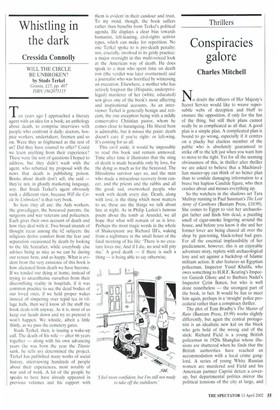Conspiracies galore
Charles Mitchell
No doubt the officers of Her Majesty's Secret Service would like to weave supersubtle webs of deception and bluff to ensnare the opposition, if only for the fun of the thing, but still their plans cannot really be as complicated as all that. A good plan is a simple plan. A complicated plan is bound to go wrong, especially if it centres on a plucky but clueless member of the public who is absolutely guaranteed to strike off to the left just when you want him to move to the right. Yet for all the seeming obviousness of this, in thriller after thriller we are asked to believe that a Machiavellian master-spy can think of no better plan than to confide damaging information to a brave but hapless Candide figure, who then crashes about and messes everything up.
So the watchers in the shadows set Tara Mullray running in Paul Sussman's The Lost Army of Cambyses (Bantam Press, £10.99). She comes to Egypt to visit her archaeologist father and finds him dead, a puzzling smell of cigar-smoke lingering around the house, and before you know it she and her former lover are being chased all over the shop by gun-toting, black-robed bad guys. For all the essential implausibility of her predicament, however, this is an enjoyable adventure story, replete with archaeological lore and set against a backdrop of Islamic militant action. It also features an Egyptian policeman. Inspector Yusuf Khalifa, who owes something to H.R.F. Keating's Inspector Ganesh Ghote and to Barbara Nadel's Inspector cetin Ikmen, but who is well done nonetheless — the strongest part of the book, in fact, It would be fun to meet him again, perhaps in a 'straight' police procedural rather than a conspiracy thriller.
The plot of Tom Bradby's The Master of Rain (Bantam Press, £9.99) works slightly differently, but again the central protagonist is an idealistic new kid on the block who gets hold of the wrong end of the stick; Richard Field is a young British policeman in 1920s Shanghai whose illusions are shattered when he finds that the British authorities have reached an accommodation with a local crime ganglord. A series of young White Russian women are murdered and Field and his American partner Caprisi detect a coverup, but departmental politics mirror the political tensions of the city at large, and they cannot see clearly who is behind it all. This is quite thick of them, since I guessed the answer to this about halfway through, something which I can practically never do as I prefer not to use my brain when I'm reading this stuff. Some of the characters also have a definite central casting whiff about them, e.g. 'Pock-faced Lu', the sinister Chinese crime-lord, who must be the twin brother of the sinister Chinese crime-lord at the start of Indiana Jones and the Temple of Doom. Again, though, it's a good page-turning read, you will want to find out what happens in the end, and there are some surprisingly subtle subtextual observations on the nature of compromise with evil.
Finally, Martin Stephen takes a refreshingly different approach in his Jacobean thriller, The Desperate Remedy (Little, Brown, €16.99). His hero, Henry Gresham, is a former soldier, a man of means with court connections and a taste for slumming it in the stews of the Jacobean underworld. He is resourceful, tough and intelligent, and for a change he knows exactly what's going on, or at least he knows that he doesn't know, and he knows too that the enjoyably nasty Robert Cecil, the King's chief secretary, is behind it all. Dastardly political and religious manoeuvrings, footpads, trollops and demented Catholics, all add up to a terrific book, the first of a long series, we must hope.



















































































 Previous page
Previous page